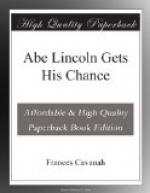This was Allen’s second trip, and he was eager to show Abe the sights. A few days later they were walking along the New Orleans waterfront. Ships from many different countries were tied up at the wharves. Negro slaves were rolling bales of cotton onto a steamboat. Other Negroes, toting huge baskets on their heads, passed by. Sailors from many lands, speaking strange tongues, rubbed elbows with fur trappers dressed in buckskins from the far Northwest. A cotton planter in a white suit glanced at the two youths from Pigeon Creek. He seemed amused. Abe looked down at his homespun blue jeans. He had not realized that all young men did not wear them.
“Reckon we do look different from some of the folks down here,” he said, as he and Allen turned into a narrow street.
Here there were more people—always more people. The public square was crowded. Abe gazed in awe at the Cathedral. This tall Spanish church, with its two graceful towers, was so different from the log meeting house that the Lincolns attended.
Nor was there anything back in Pigeon Creek like the tall plaster houses faded by time and weather into warm tones of pink and lavender and yellow. The balconies, or porches, on the upper floors had wrought iron railings, of such delicate design that they looked like iron lace.
Once the boys paused before a wrought iron gate. At the end of a long passageway they could see a courtyard where flowers bloomed and a fountain splashed in the sunshine. Abe turned to watch a handsome carriage roll by over the cobblestones. He looked down the street toward the river, which sheltered ships from all over the world.
“All this makes me feel a little like Sinbad,” he said, “but I reckon even Sinbad never visited New Orleans. I sure do like it here.”
But soon Abe began to see other sights that made him sick at heart. He and Allen passed a warehouse where slaves were being sold at auction. A crowd had gathered inside. Several Negroes were standing on a platform called an auction block. One by one they stepped forward. A man called an auctioneer asked in a loud voice, “What am I offered? Who will make the first bid?”
“Five hundred,” called one man.
“Six hundred,” called another.
The bids mounted higher. Each slave was sold to the man who bid, or offered to pay, the most money. One field hand and his wife were sold to different bidders. There were tears in the woman’s dark eyes as he was led away. She knew that she would never see her husband again.
“Let’s get out of here,” said Abe. “I can’t stand any more.”
They walked back to their own flatboat tied up at one of the wharves. Allen got supper, but Abe could not eat.
“Don’t look like that,” said Allen. “Many of the folks down here inherited their slaves, same as their land. Slavery ain’t their fault.”
“I never said it was anybody’s fault—at least not anybody who’s living now. But it just ain’t right for one man to own another.”




